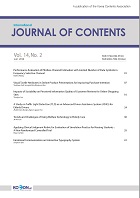- 권한신청
- P-ISSN1738-6764
- E-ISSN2093-7504
- KCI
 ISSN : 1738-6764
ISSN : 1738-6764
Logic of Quantum Mechanics for Information Technology Field
Abstract
Quantum mechanics is a branch of physics for a mathematical description of the particle wave, and it is applied to information technology such as quantum computer, quantum information, quantum network and quantum cryptography, etc. In 1936, Garrett Birkhoff and John von Neumann introduced the logic of quantum mechanics (quantum logic) in order to investigate projections on a Hilbert space. As another type of quantum logic, orthomodular implication algebra was introduced by Chajda et al. This algebra has the logical implication as a binary operation. In pure mathematics, there are many algebras such as Hilbert algebras, implicative models, implication algebras and dual BCK-algebras (DBCK-algebras), which have the logical implication as a binary operation. In this paper, we introduce the definitions and some properties of those algebras and clarify the relations between those algebras. Also, we define the implicative poset which is a generalization of orthomodular implication algebras and DBCK-algebras, and research properties of this algebraic structure.
- keywords
- Hilbert algebras, implication algebras, DBCK-algebras, orthomodular implication algebras, implicative posets.
- 다운로드 수
- 조회수
- 0KCI 피인용수
- 0WOS 피인용수

